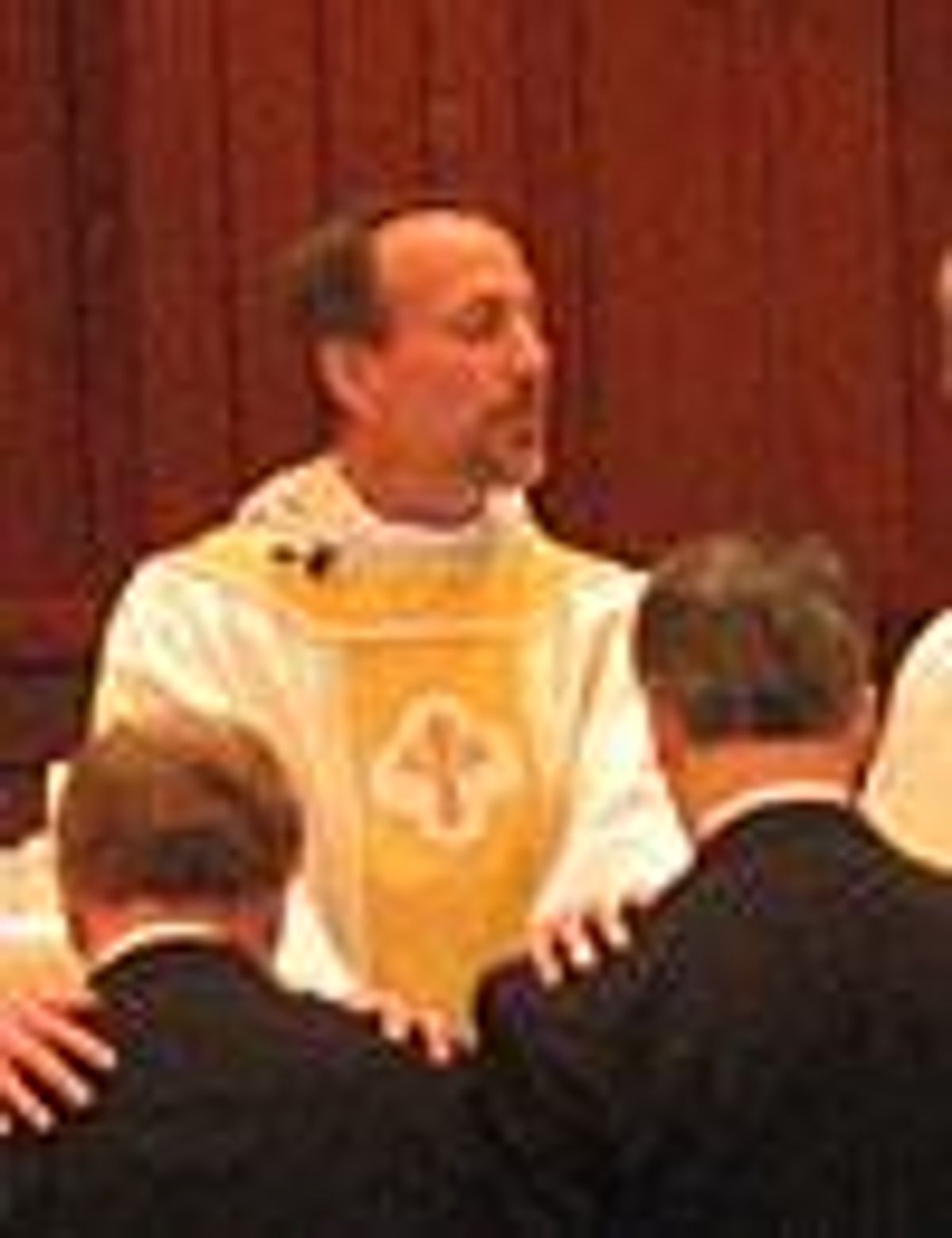The Reverend V.
Gene Robinson said that he "always wanted to be a
June bride." And this weekend he got
hitched. Well, not quite.
In a private
ceremony that took place five years to the day from when he
was elected as the ninth bishop of the Diocese of New
Hampshire in the Episcopal Church, U.S.A., Robinson
and his partner of 20 years, Mark Andrew, said
"I do" in a civil union.
But as the news
of the Church's first openly gay, noncelibate priest
to be consecrated as bishop reverberated throughout
the worldwide Anglican Communion half a decade ago, so
too did the news of his civil union.
But for those of
us who gathered this weekend at St. Paul's Episcopal
Church in Concord, N.H., we came to do what the celebrant
(an officiant, to you non-churchgoing folk) asked
of us: "to witness the joining of Gene and Mark
in civil union and to do all in our power to support them
in their commitment."
More than 120 of
us were furtively lodged in suggested nearby hotels,
where Robinson reserved blocks of rooms we accessed by using
the secret code: "Bishop Robinson sent
me." After the service we piled in our cars and
drove 14 miles to the historic Canterbury Shaker Village for
the reception. Security and media were present but the
day went off without a glitch. But when Robinson
returns from his honeymoon bliss, two pressing
questions await him:
1) Why a June
civil union just weeks before Lambeth Conference in
July? 2) And, why a religious service following
his civil union?
Robinson's sole patrol
The tumultuous
events surrounding the election and consecration of
Robinson is the prism through which we see the Episcopal
Church's longtime struggle and history with its
LGBTQ community.
The Lambeth
Conference, the once-a-decade gathering of archbishops and
bishops united in Anglican brotherhood, has functioned as
the Church's only white and only male club of
heterosexual power brokers. The Conference has ignored
without moral compunction its LGBTQ parishioners, and
until recently the Anglican Communion's Global South
-- comprised mostly of Third World countries in
Africa, South America, and Asia.
The Reverend with Andrew (right) and guest
And Robinson said
so in the Concord Monitor in November
2007: "I think [that] for a long time white men have
ruled the world. With the emergence of people of color, the
emergence of the women's movement, with the emergence of gay
and lesbian folk standing up . . . I think it's a
threat to the way things have always been with white
men being in charge."
Robinson will not
be seated at Lambeth next month, and all efforts to
include him, even in a limited capacity, have failed because
the more conservative wing of clerics gathering next
month uphold the 1998 Lambeth Conference's
controversial resolution stating homosexuality is contrary
to the Church's teaching of Scripture.
But is it?
In the 1970s the
argument for authority of Scripture came up with the
ordination of women--and so too the threat of schism.
But in 1989 the church consecrated its first female
bishop -- Barbara C. Harris. And conservatives
were not only theologically outraged but also racially
challenged because Harris is African-American.
And in 2006 gasps
of both exhilaration and exasperation reverberated
throughout the Anglican Communion when it was announced that
Katharine Jefferts Schori would be the Presiding
Bishop of the Episcopal Church, U.S.A.
So I ask, what
date in the worldwide Anglican Communion's calendar
would be permissible for Robinson's civil
union?
But a blogger
reading the headline in Religion & Ethics
that stated: "Gay bishop, partner plan civil union,
" asked an equally important question: "If he is
a bishop why should he have a civil union? Shouldn't
he have a church wedding?"
Robinson's
marginalization, however, is not only evident by his absence
at this year's Lambeth Conference. His
marginalization is also evident in this country's
"separate and unequal" covenantal arrangements
for LGBTQ Americans and also in his church's
refusal to marry Andrew and him in a religious rite of
blessing.
Happy couple
So why does
Robinson bother to be a June bride?
In
Robinson's new book, In the Eye of the Storm:
Swept to the Center by God he answers the
question.
"Our civil
union will no doubt be reported by the press. I can't stop
that. But I can rejoice that somewhere in Idaho or Ontario
or Sussex there's a gay boy or a lesbian girl who will
read about it and know that they too can aspire to a
healthy, whole life with a person of the same sex --
and that they don't have to give up their faith along the
way. It might occur to them that they too can put
their sexuality and their spirituality together in a
way that makes for happiness and spiritual depth. Like
me, they may have always dreamt of being a June bride. But
unlike me, they will know it is possible."


















































































Here's our dream all-queer cast for 'The White Lotus' season 4